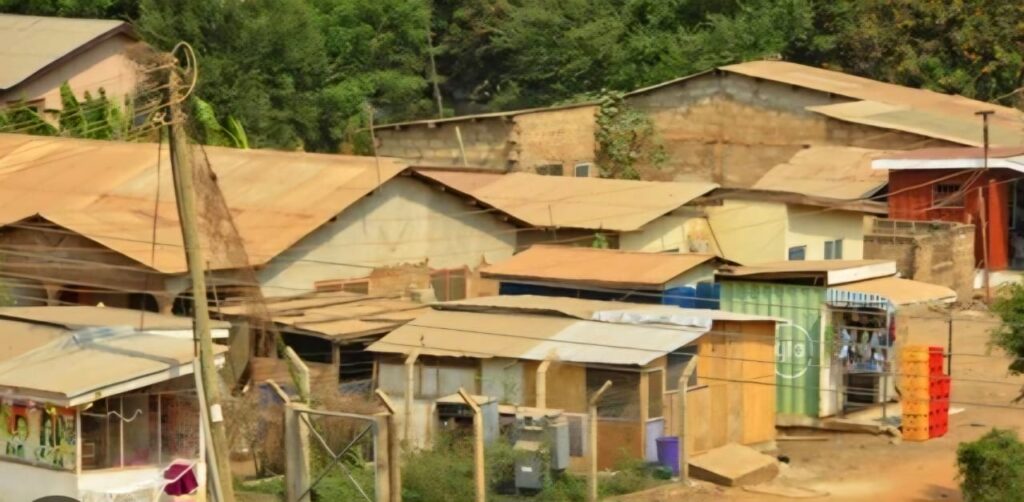In the bustling cityscape of Accra, a quiet yet striking phenomenon is reshaping urban living—a response to the city’s escalating housing crisis. Wooden kiosks, often overlooked during the day, come alive at night as homes for street hawkers, laborers, and other struggling workers. These structures, originally intended as small shops or storage units, are now doubling as makeshift “single rooms” for those priced out of formal housing.
This trend, born of necessity, underscores deep-seated issues of housing inequality, urban planning failures, and the resilience of the informal economy. For many, these kiosks are not just shelter but a lifeline, providing a place to rest after a long day hustling in the city streets.
A Growing Housing Crisis
Accra’s housing deficit has reached critical levels in recent years, leaving low-income earners with few options. Formal housing, with its exorbitant rent and long-term payment demands, is out of reach for street hawkers and day laborers who earn meager daily wages. Wooden kiosks, available for rent on a daily or weekly basis, have become a practical alternative for those who cannot afford even the most basic rooms.
During the day, these kiosks blend into the urban landscape, often appearing abandoned or underused. However, as night falls, they transform into vital shelters, providing temporary refuge to individuals navigating Accra’s chaotic streets. For many hawkers who spend their days selling goods or offering services, the kiosk is a place to rest their weary bodies, recharge, and prepare for another day of toil.
Some kiosk owners, who use the structures for business during the day, rent them out in the evenings, creating a profitable side hustle. For the renters, the kiosks are not ideal, but they serve the critical need for a place to lay their heads.
Curiosity about this phenomenon led me to investigate further. In my neighborhood, I had often noticed what appeared to be an abandoned kiosk attracting occasional visitors late at night. One evening, I decided to observe more closely. As darkness settled, a young man discreetly entered the kiosk and closed the door behind him. Intrigued, by what l saw, the next day early in the morning, I went to his location and struck up a conversation with him the following morning.
He revealed that the kiosk was his nightly shelter, rented for a modest fee. For him, this arrangement was a practical compromise. The cost of renting a proper room or hostel in Accra was far beyond his means, and the kiosk, though cramped and lacking amenities, provided safety and privacy he couldn’t find on the streets. “If not for these kiosks,” he said, “many of us would be sleeping outside.”
His story was a sobering reminder of how widespread this reality has become. Across Accra, countless kiosks, which might appear derelict to passersby, are homes for the city’s most vulnerable. Yet, even this form of shelter is out of reach for some, forcing many to sleep on pavements or under open skies.
The emergence of kiosks as informal housing reflects both human ingenuity and systemic failure. For kiosk owners, renting out these structures is a lucrative business, generating steady income from a growing demand. The daily or weekly payments, while burdensome for the renters, are easier to manage than the upfront costs of formal housing.
However, this arrangement comes with significant challenges. Most kiosks lack basic amenities such as running water, proper ventilation, or sanitation facilities, exposing residents to serious health risks. Crime is another concern, as the temporary nature of this housing leaves occupants vulnerable to theft or violence. Additionally, the lack of regulation means that these informal rentals operate in a legal gray area, with no protections for either renters or owners.
The proliferation of kiosk housing is a stark indicator of Accra’s housing crisis and a call to action for city authorities. While informal solutions like these address immediate needs, they are not sustainable in the long term. The absence of affordable housing options for low-income earners highlights systemic gaps in urban planning and governance.
Addressing this issue requires a multi-pronged approach. City planners must work to increase the availability of affordable housing while regulating the use of kiosks for residential purposes. Public-private partnerships could be explored to develop low-cost housing projects tailored to the needs of the city’s urban poor. Additionally, policies that support small-scale entrepreneurs could help individuals transition from precarious living conditions to more stable arrangements.
Accra’s housing crisis demands urgent and innovative responses. As the city continues to grow, the challenge will be to ensure that no one is left behind in the pursuit of progress. For now, the kiosks stand as a testament to human adaptability in the face of adversity—a temporary fix to a problem that requires lasting solutions.
FIIFI NETTEY
MEDIA CONSULTANT











